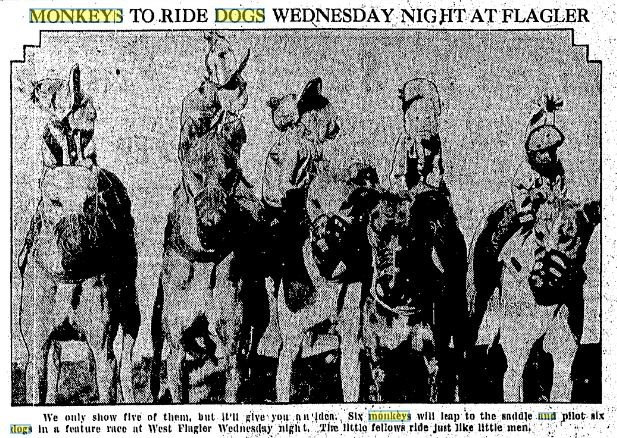Almost 40 years ago, a query came into the Action Line, a long-gone Miami Herald column that pretty much played the role Google does today, answering obscure questions and giving out advice. The writer, "M. Weisbaum" of Plantation, had heard that dog-racing tracks once employed monkeys as jockeys. "This is too much," the November 3, 1981 letter said. "What about it, Action Line, true or untrue?"
The verdict: true. If it was hard to believe then, it's even harder to believe now. But way back in the '30s, monkeys in sequined pants and tiny hats clung to the backs of greyhounds on tracks across South Florida. With dog racing on its way out after Floridians voted this month to approve a statewide ban, the monkey jockeys will go down as one weird bit of history in the sport's nearly 100-year run in the Sunshine State.
It apparently started in January 1933, when six monkeys were brought from California for a series of special events at West Flagler Kennel Club. An article in the Herald announced the debut of the tiny jockeys under the headline Monkeys To Ride Dogs Wednesday Night at Flagler.
"They say the dogs don't need jockeys, but just the same we're going to see the monkeys up there riding for king and country," the article said, noting they would wear jockey uniforms and ride "just like little men."
The monkeys had been a hit when they were used as jockeys in California, where they were trained. They proved popular in Miami, too, filling the stands at tracks to capacity. Monkey riders also appearances in dog races in St. Petersburg, Palm Beach, and Jacksonville, according to newspaper archives.
Everyone involved insisted it was a blast for both the dogs and monkeys and not at all cruel to the animals.
"People all over the country loved to watch the animals. And the animals loved doing it!" gushed the announcer in an old video describing the strange attraction. "Their competitive spirit was intense."
It was so intense, in fact, that the monkeys had to be strapped onto the dogs. This was because they got so excited during tight races that they tried to tear the clothes off other monkeys and screamed while using their tails as whips, the video reported. Nope, no cruelty involved!
One enterprising guy, a Jacksonville native named Rennie Renfro who trained animals for Hollywood, went as far as filing a patent for a contraption that would keep the primate in place. A collar wrapped around the monkey's neck was hitched to the greyhound, ensuring the monkey would be hunched over in the posture of a human jockey. The monkey's tail was jammed into the harness. His feet were secured, too.
But the monkey jockeys ended up as just a passing fad. It's not totally clear what happened. A 1993 story in the Palm Beach Post quoted a longtime Palm Beach Kennel Club employee as saying that the "monkey races always used to draw a crowd. But the Humane Society put a stop to that.''
The Action Line reported that the Flagler Kennel Club discontinued the practice after "some people got upset because the monkeys looked as though they'd hightail it up the nearest tree if they weren't strapped in for the ride."
So, the monkey jockeys have been relegated to the annals of weird Florida and now mostly forgotten. By the end of 2020, greyhound racing will be gone altogether.
[
{
"name": "Air - MediumRectangle - Inline Content - Mobile Display Size",
"component": "19274298",
"insertPoint": "2",
"requiredCountToDisplay": "2"
},{
"name": "Editor Picks",
"component": "17482312",
"insertPoint": "4",
"requiredCountToDisplay": "1"
},{
"name": "Inline Links",
"component": "18711090",
"insertPoint": "8th",
"startingPoint": 8,
"requiredCountToDisplay": "7",
"maxInsertions": 25
},{
"name": "Air - MediumRectangle - Combo - Inline Content",
"component": "17482310",
"insertPoint": "8th",
"startingPoint": 8,
"requiredCountToDisplay": "7",
"maxInsertions": 25
},{
"name": "Inline Links",
"component": "18711090",
"insertPoint": "8th",
"startingPoint": 12,
"requiredCountToDisplay": "11",
"maxInsertions": 25
},{
"name": "Air - Leaderboard Tower - Combo - Inline Content",
"component": "17482313",
"insertPoint": "8th",
"startingPoint": 12,
"requiredCountToDisplay": "11",
"maxInsertions": 25
}
]













